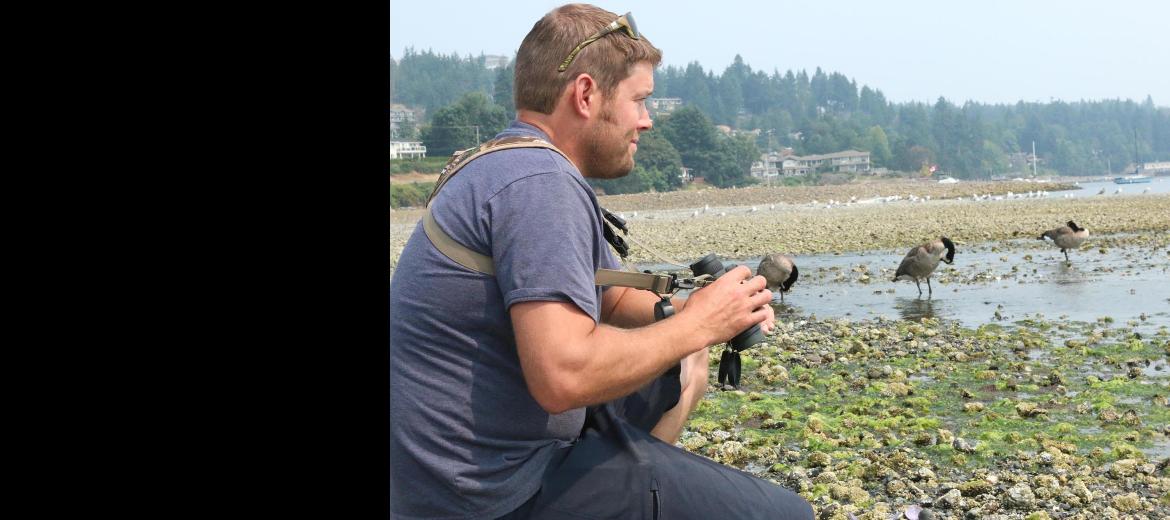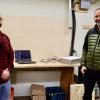
Stew Pearce, a VIU alumnus, is monitoring Canada geese to determine population levels and migration habits to help the City of Nanaimo identify management strategies.
September 26, 2017 - 11:00am
Public participation is crucial for the success of the VIU Canada Goose Project
While some Canada geese in the Nanaimo area are frequent flyers others are homebodies.
Stew Pearce, a VIU alumnus, has been monitoring the migration habits of Canada geese through the VIU Canada Goose Project, which he started as part of his undergraduate research. He is now working under contract with the City of Nanaimo, an initial partner on the initiative, to build upon what was learned during his undergraduate research project.
With the help of volunteers, 400 Canada geese have received a white collar on their neck, which displays three numbers and the letter P. These collared geese also received metal leg bands for better cross-border tracking.
“Banding the birds allows us to get a population estimate and discover migration habits that will help shape management strategies,” said Pearce.
Pearce does roving counts of the collared birds, but said public participation is crucial to the success of the project. People are encouraged to report sightings on the VIU Canada Goose Project website, wordpress.viu.ca/gooseproject. The more people who participate the more accurate picture there will be of the abundance, distribution and movement of Canada geese.
Eric Demers, a VIU biology professor and Pearce’s supervisor on the initial project, said gauging population numbers and migration habits are important to help with management strategies.
“You can’t manage something if you don’t know how many there are or where they go. It’s like trying to manage a moving target,” said Demers, adding that Canada goose management strategies can’t be handled by one municipality in isolation.
Most Canada geese in the Departure Bay area are resident geese, said Pearce. Resident geese typically have higher breeding success because they don’t spend much energy migrating. The geese found in the Nanaimo River Estuary seem to be more migratory.
In the first year of the study 200 geese were collared. Data suggested that the summer population of Canada geese in the Nanaimo area ranged from about 500-700 geese, while the winter population swelled to about 1,600 to 1,800. Approximately 30 per cent of the geese stayed in the Nanaimo area throughout the winter, while another 30 per cent migrated from the area. Sightings of these migratory geese ranged from locations such as Port Alberni, Sechelt and Parksville, to Anacortes, Wash., and Eugene, Ore. Amongst the remainder of collared geese, about seven per cent were harvested by hunters, one per cent died due to predators and the remainder left the Nanaimo area and sightings have not been reported.
Kevin Brydges, a City of Nanaimo Environmental Protection Officer, said the city is trying to monitor the resident population of Canada geese to determine how many there are and the different life stages. He said understanding how the resident Canada geese behave helps the city identify management strategies and the effectiveness of programs already in place.
The city is coordinating efforts through the Vancouver Island Regional Canada Goose Working Group, comprised of municipalities, non-governmental organizations and First Nations.
Managing Canada geese populations is becoming increasingly important as more conflicts arise between birds and humans. Rising population levels are impacting sensitive ecosystems such as the Nanaimo River Estuary because Canada geese rip out plants by the roots, which can cause soil erosion. Sports fields, where Canada geese graze, can also be damaged and users don’t want to play on fields with their droppings, said Brydges. Geese can also damage agricultural crops by eating seedlings, leaves or stalks.
Pearce said one of the reasons resident Canada geese numbers have increased over the years is because of introduction programs by government and private organizations in the 1970s and ’80s, which aimed to increase hunting and nature viewing opportunities on Vancouver Island.
-30-
MEDIA CONTACT:
Rachel Stern, Communications Officer, Vancouver Island University
P: 250.741.2020 | C: 250.618.7296 | E: rachel.stern@viu.ca | T: @VIUNews
Tags: Research






